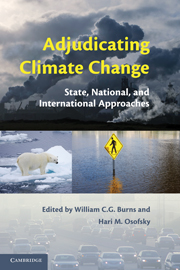Book contents
- Frontmatter
- Contents
- Foreword
- Acknowledgments
- Adjudicating Climate Change
- 1 Overview: The Exigencies That Drive Potential Causes of Action for Climate Change
- PART I SUBNATIONAL CASE STUDIES
- 2 State Action as Political Voice in Climate Change Policy: A Case Study of the Minnesota Environmental Cost Valuation Regulation
- 3 Litigating Climate Change at the Coal Mine
- 4 Cities, Land Use, and the Global Commons: Genesis and the Urban Politics of Climate Change
- 5 Atmospheric Trust Litigation
- PART II NATIONAL CASE STUDIES
- PART III SUPRANATIONAL CASE STUDIES
- 17 Conclusion: Adjudicating Climate Change across Scales
- Index
- References
3 - Litigating Climate Change at the Coal Mine
Published online by Cambridge University Press: 25 August 2009
- Frontmatter
- Contents
- Foreword
- Acknowledgments
- Adjudicating Climate Change
- 1 Overview: The Exigencies That Drive Potential Causes of Action for Climate Change
- PART I SUBNATIONAL CASE STUDIES
- 2 State Action as Political Voice in Climate Change Policy: A Case Study of the Minnesota Environmental Cost Valuation Regulation
- 3 Litigating Climate Change at the Coal Mine
- 4 Cities, Land Use, and the Global Commons: Genesis and the Urban Politics of Climate Change
- 5 Atmospheric Trust Litigation
- PART II NATIONAL CASE STUDIES
- PART III SUPRANATIONAL CASE STUDIES
- 17 Conclusion: Adjudicating Climate Change across Scales
- Index
- References
Summary
INTRODUCTION
In Australia, the most prominent climate change cases have involved attempts to stop greenhouse gas emissions from the burning of coal before that coal is even mined. Suing under state or national environmental impact assessment laws, Australian environmentalists have sought to compel government agencies responsible for approving coal mining projects to consider the very significant amounts of greenhouse gases that will be emitted at the time that the mined coal is burned to generate energy. With this approach, environmentalists have had some notable success in ensuring that such “indirect” or “downstream” greenhouse gas emissions are assessed as part of the decision-making process.
The Australian coal mining cases analyzed in this chapter are harbingers of a potentially large wave of legal actions that could arise under environmental impact laws in jurisdictions throughout the world. Environmentalists dissatisfied with their government's climate change policies are particularly likely to seek remedies through the judiciary where possible. Yet as they do, they will inevitably confront complex and difficult issues regarding how and the extent to which a particular project under consideration can be said to have an impact on the global climate. Whether and how greenhouse gas emissions should be assessed in the context of environmental impact studies for particular local projects is a key question for environmental policy in our new carbon-constrained world.
Australia is a fitting place for climate change activists to lodge novel claims about the climate change implications of coal mining.
- Type
- Chapter
- Information
- Adjudicating Climate ChangeState, National, and International Approaches, pp. 48 - 71Publisher: Cambridge University PressPrint publication year: 2009
References
- 2
- Cited by

